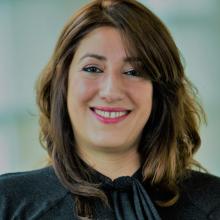2023 SRCD Federal Policy Fellow Spotlight: Neda Senehi, Ph.D.
In a few sentences, what is your role at the agency you work for?
I work in the Office of Planning, Research, and Evaluation (OPRE), Administration for Children and Families (ACF), U.S. Department of Health and Human Services (HHS). My work involves supporting OPRE’s early care and education research and evaluation projects that aim to improve the lives for children and families served by ACF programs. I enjoy working in the Division of Child and Family Development where I collaborate with federal staff and research partners to carry out policy-based research and evaluation projects focused on Head Start, child care, and child welfare. As a fellow, I lead initiatives to disseminate and translate research findings to a variety of audiences, identify and prioritize research questions of interest and relevance to programs and populations served by ACF, and contribute to OPRE’s efforts focused on increasing diversity, equity, inclusion, and belongingness in the workplace.
What words of wisdom might you pass on to someone who is interested in SRCD’s fellowship program?
I suggest you prepare for applications and interview process by reaching out to current fellows and conducting informational interviews. This is a good way to find out about offices or roles you may like to consider when drafting your application materials. Once you are selected as a fellow, I suggest taking advantage of your professional development funds to advance your understanding or build skills in an area outside of your wheelhouse of expertise. During the fellowship, I also found great comfort and guidance from my peers as well as previous and current fellows.
What has been your favorite aspect of SRCD’s fellowship? Please explain why.
My favorite aspect of SRCD’s fellowship has been learning about the multiple ways and levels of impact that early childhood research is conducted. It has been so exciting to learn about the cross-disciplinary work that is funded and conducted in OPRE as well as other offices in ACF and HHS. My scientific identity has expanded beyond my doctoral and postdoctoral training to areas outside of my expertise and policies that I had not worked on during my academic training. This experience has been so valuable and exciting as I continue to pivot and pave my career path in developmental science which has always been dear and near to my heart.
How do you think the fellowship has helped further your career?
The fellowship has helped me advance my career goals in several ways. Across my roles and responsibilities in OPRE, I have had the privilege to connect and work with a variety of researchers, organizations, policymakers, and program partners. This opportunity has allowed me to hone my science communication and leadership skills. I have met and collaborated with audiences that I would not have otherwise known and have been in conversations that shaped policy, research, and evaluation agendas that I would not have otherwise been involved in. The network of resources and colleagues that I have created during my fellowship has broadened my collaborative opportunities to do meaningful and impactful work in early care and education.
What piqued your interest in working in policy?
During my doctoral and postdoctoral training, I gained expertise in investigation of early parent-child relationship quality as a factor that would either buffer or exacerbate the effects of early stress on development of self-regulation. My goal was to use this line of evidence to design and implement parent skill-based programming to prevent the negative cascading effects of early adversity on social-emotional development in children from families with low incomes. I thought of cumulative stress as a hailstorm that would be buffered under the umbrella of supportive parent-child relationship quality. During my training, I also became painfully aware of the large evidence-to-implementation gap that exists in early childhood research. I wanted to work in science policy to figure out how to reduce this gap (which is a large barrier to equitable health outcomes) and to expand that protective umbrella to a larger policy-based protective tent that would support more children who experience a broader range of adversities.
What is your favorite place you have traveled?
I love Costa Rica. Somewhere between the warm and clear ocean waves, playful dolphins swimming off in breathtakingly beautiful sunsets, the tasty Arabica coffee, the many musical bird species, and the Pura Vida attitude of the locals, it is so easy to surrender to nature and reconnect with one’s true essence. If you choose to travel to Costa Rica, be ready to experience nature in its glory, but, be warned about the mischievous monkeys who may look adorable and innocent but will in fact steal your food and feel entitled to violently scream in your face while doing it.
